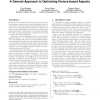15 search results - page 3 / 3 » Impeding Malware Analysis Using Conditional Code Obfuscation |
IJNSEC
2008
13 years 4 months ago
2008
One approach to protect distributed systems implemented with mobile code is through program obfuscation. Disguising program intent is a form of information hiding that facilitates...
VIROLOGY
2010
13 years 3 months ago
2010
Abstract. This paper gives an overview of our research in the automation of the process of software protection analysis. We will focus more particularly on the problem of obfuscati...
WWW
2010
ACM
13 years 11 months ago
2010
ACM
JavaScript is a browser scripting language that allows developers to create sophisticated client-side interfaces for web applications. However, JavaScript code is also used to car...
CCS
2007
ACM
13 years 8 months ago
2007
ACM
Remotely-launched software exploits are a common way for attackers to intrude into vulnerable computer systems. As detection techniques improve, remote exploitation techniques are...
AOSD
2009
ACM
13 years 11 months ago
2009
ACM
Many aspects for runtime monitoring are history-based: they contain pieces of advice that execute conditionally, based on the observed execution history. History-based aspects are...

